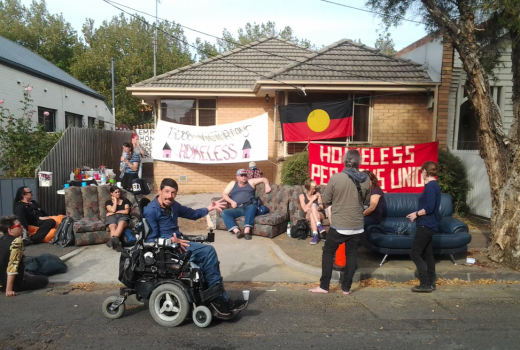
Local governments can achieve better social outcomes for their communities if they are prepared to support grassroots community activism, a researcher says.
Mike Collins, an honorary research fellow with the Melbourne Social Equity Institute, was involved in his capacity as a local government policy officer in the occupation of a string of vacant homes by activists in Collingwood’s Bendigo Street in 2016.

He argues the events that unfolded that year show councils need to recognise that community advocacy is not something to be controlled, but something to be part of.
In a report penned for the Melbourne Social Equity Institute with homelessness activist Kelly Whitworth, Mr Collins looks at the Bendigo Street Occupation, which involved 300 houses that had been acquired by the state government to make way for the dumped East West Link project.
Across the campaign, up to 15 houses were occupied and up to 60 people were housed including children and families.
Despite the occupation by activists, and previous separate advocacy by Yarra City Council to turn the properties into social housing, the occupiers ended up being evicted and the houses sold on the private market.
Lost opportunity for council
Mr Collins says the event was a lost opportunity for Yarra Council to achieve an important housing policy outcome.
“What we discovered was Council’s strong advocacy faded into the background in the heat of the action,” he told Government News.
“I think it was absolutely a lost opportunity.
”There was an opportunity that local government had to really bolster the action, and the point they were making about the use of government property.”

The authors argue in the report that the occupation contains lessons that can inform a meaningful new relationship between councils and grass-roots social activism.
“Bendigo Street demonstrated what appears to be a common experience: confused relationships between activists and government officials, with the latter sometimes being supportive of such actions, but at other times opposed, ambivalent or absent,” the report says.
“Many local governments, especially in inner-urban areas, have policy positions that align with the aims of homelessness and housing activists. This research explores how this policy alignment can be translated into effective action.”
Supporting activism
The report argues that “where a local government’s aims and values coincide with those of activists, local councils can use their resources to act and do things to support the activists”.
The report recommends that councils can take a range of actions to do this, including developing policy frameworks for engaging with activism, using in-house communications teams to support campaigns, and providing legal funds and on-ground logistics for activists.
Local government has the potential to be a powerful ally to activists once the ‘enabling environment’ is switched on.
Activists also need to better understand how local government works, how decisions are made, and the roles of officers and coucillors, Mr Collins says.
“Local government has the potential to be a powerful ally to activists once the ‘enabling environment’ is switched on,” the research paper says.
Mr Collins hopes his report raises questions for local government that go beyond just housing.
“The question we want to ask of local government is how do you take a stand and …. on what basis do you decide we’re going to stand with the community?” he says.
“We’re talking about housing policy, but the broader questions are around the role of local governments … having resources to bolster community action.”
Policy framework
But that doesn’t mean every activist group should be indiscriminately supported, he says.
Decisions about aligning with activists need to be grounded in democratically supported policy settings and “not just everything that pops up”.
“Council needs to have those frameworks in place so councillors can assess if they have a mandate to work in the area,” he says.
“There are risks in saying councils should get behind their local activists if they make enough noise.”
He notes that Victoria’s recently updated Local Government Act requires council to have a community engagement policy and to apply a more active and participatory lense to their operations.
Mr Collins says while the Bendigo Street houses ended up being sold on the private market, the outcome could have been different if Council had worked more closely with the activists.
“In terms of the use of the houses and whether they’d be put into use, rather than sold for private use, I think that would have been a different outcome,” he says.
Comment below to have your say on this story.
If you have a news story or tip-off, get in touch at editorial@governmentnews.com.au.
Sign up to the Government News newsletter

No. Society fast becomes a disaster as noisy minority groups get a voice.
We’re all for everyone being housed but letting groups like these squat in vacant houses only devalues surrounding houses and increases the likelihood of crime, violence and drug usage in an area.
In similar situations, such individuals need to be given the opportunity to go to a NON-INNER CITY government-constructed community with housing, employment where they can get educated and put themselves to work and deliver value to society for the benefits they’re on.
There needs to be more done for them than just putting a roof over their heads or allowing them to squat in vacant homes.
Inner cities are not the place for homeless people. It only exacerbates their issues.
I thank Farzana & Omar for this comment. It saddens me to read it as you seem to be expressing a view that community members who do not have homes do not have the same rights as others. I might ask you to look at our sad shameful recent history of exclusion of First Nations people from towns and cities.